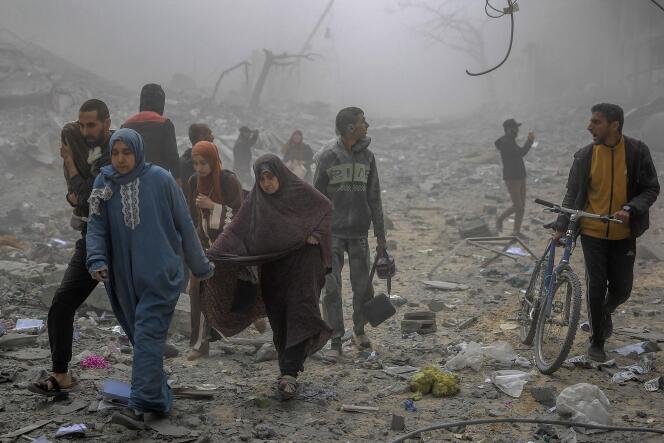


Struck by bullets, the man collapsed, still holding a small white bundle. The scene, in a video broadcast by the Qatari news channel Al-Jazeera on Thursday, April 4, depicts yet another search for food that turns into a nightmare. It took place to the east of Gaza City's Shujaiya district, close to the security barrier that separates the Gaza Strip from Israeli territory. Soldiers opened fire on Palestinians who were trying to collect bags of humanitarian aid that had been airdropped by a US army C-17 transport plane, not far from an Israeli army position. One of them was shot dead as he walked away with his back to them. Stray dogs began to approach.
While almost 80% of Gaza's population has been displaced since the war began on October 7, 2023 – most of them to the south – over 300,000 people are still reportedly trapped in the north of the Gaza Strip. They have been unable to leave since the Israeli army split the territory in two. Under siege, the north is sinking into famine.
Before October 7, 0.8% of children under 5 were suffering from acute malnutrition in Gaza. In the northern governorates, this figure jumped from 12.4% to 16.5% in March, according to data from the World Health Organization (WHO). Israeli Prime Minister Benyamin Netanyahu, under pressure from his ally, the US, announced on Friday that supplies would be transported to northern Gaza from the port of Ashdod.
Since January, the inhabitants of Gaza's north have been forced to survive on an average intake of 245 calories a day, all while Israeli forces continue their military offensive, warned the British NGO Oxfam in a report published on Thursday. This tiny nutritional figure is less than 12% of the recommended daily intake of 2,100 calories per person.
"Imagine having to survive on 245 calories day in, day out, but also having to watch your children or elderly relatives do the same. All while displaced, with little to no access to clean water or toilets, and knowing that most of the hospitals that are still running are operating at their lowest capacity and are under constant threat from drones and bombs," said Amitabh Behar, the interirm executive director of Oxfam International.
On March 31, four children died at the Kamal Adwan hospital in Beit Lahia, according to the hospital's medical staff. This establishment, the only pediatric hospital in the north, was already operating well over capacity due to the growing number of patients and displaced civilians seeking shelter, and has seen a new wave of patients pour in since the total destruction of Al-Shifa Hospital, the territory's largest, at the end of March. Among the wounded are severe burn victims, struck by the bombings, and young patients with chronic illnesses, whose conditions have been worsening daily. This has been due to the lack of food, baby formula milk, medicine and equipment. In March, a dozen children died of malnutrition, according to the WHO.
You have 64.24% of this article left to read. The rest is for subscribers only.
